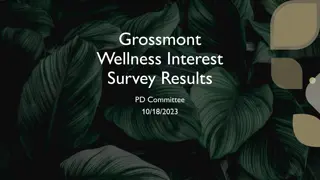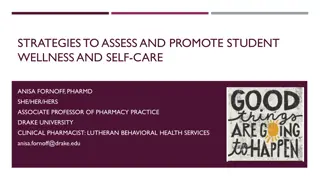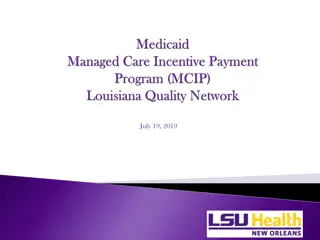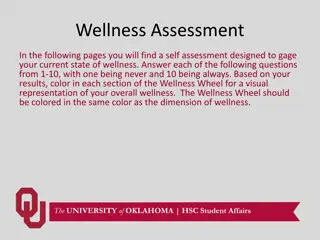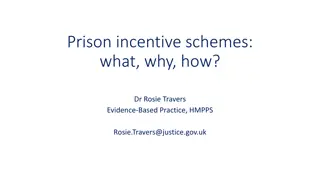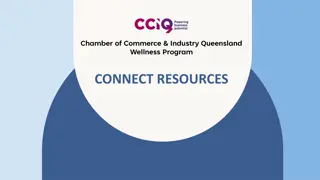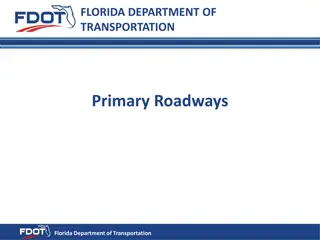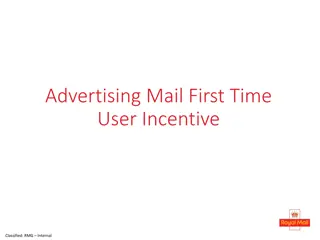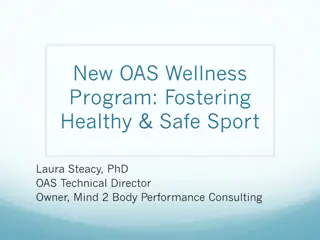Empowering Wellness through Incentives: The WIN Program
Learn about the Medicaid Incentives for Prevention of Chronic Disease (MIPCD) initiative and the Wellness Incentives and Navigation (WIN) program in Texas. MIPCD offers grants for projects focusing on tobacco cessation, weight loss, cholesterol control, blood pressure management, and diabetes prevention. WIN targets Medicaid Managed Care members in the Harris service area, aiming to improve health outcomes by incentivizing healthy behaviors. Discover the importance of addressing behavioral health conditions to prevent chronic physical diseases and reduce healthcare costs.
- Wellness Incentives
- Medicaid
- Chronic Disease Prevention
- Texas Health Services
- Healthcare Initiatives
Download Presentation

Please find below an Image/Link to download the presentation.
The content on the website is provided AS IS for your information and personal use only. It may not be sold, licensed, or shared on other websites without obtaining consent from the author. Download presentation by click this link. If you encounter any issues during the download, it is possible that the publisher has removed the file from their server.
E N D
Presentation Transcript
Incentives to Wellness Dena Stoner Texas Department of State Health Services dena.stoner@dshs.state.tx.us Sam Shore Triwest Group sshore@triwestgroup.net
What is MIPCD? Medicaid Incentives for Prevention of Chronic Disease (Sec 4108 ACA) Competitive five year federal grant opportunity from Centers for Medicare and Medicaid Services (CMS). No state match required. Funds demonstration projects that use evidence-based incentives to help Medicaid clients adopt healthy behaviors, improve outcomes Projects must address at least one of the following goals: tobacco cessation, controlling or reducing weight, lowering cholesterol, lowering blood pressure, or avoiding onset of diabetes or improving management of diabetes. 2 2 2 2 2
MIPCD State Projects STATE TOBACCO CESSATION WEIGHT LOSS LOWERING CHOLESTEROL LOWERING BLOOD PRESSURE DIABETES MANAGEMENT OR PREVENTION X CA CT HI MN MO NV NH NY TX WI X X X X X X X X X X X X X X X X X X X X X X X 3 3 3 3 3
Wellness Incentives and Navigation (WIN) Stoner 4
What is WIN? Wellness Incentives and Navigation (WIN) Texas MIPCD Project $9.9 million grant Medicaid & State Health Services partnership Project imbedded in Medicaid delivery system Randomized Controlled Trial in Harris Service Delivery Area for Medicaid Managed Care Over 1,600 participants in intervention, control and comparison groups 5 5 5 5 5
Target Population Medicaid Managed Care (STAR+PLUS) members, ages 21 55 who: Live in the Harris service delivery area (Harris, Austin, Waller, Fort Bend, Montgomery, Wharton, Brazoria, Galveston and Matagorda Counties) Are not receiving Medicare Have either serious mental illness, OR behavioral + chronic health conditions 6 6 6 6 6
Why WIN? Risk - People with behavioral health conditions are significantly more likely to suffer chronic physical disease, and to die at a younger age. (29 years earlier than other Texans.). Leading causes of death are heart disease, cancer and lung disease. Cost Behavioral health conditions contribute significantly to higher medical costs (9 percent of TX Medicaid initial admissions,; 27 percent of potentially preventable readmissions). Opportunity Capitated managed care is Texas Medicaid s dominant health care delivery system for adults with disabilities. Significant potential for large scale change, if successful. 7
WIN Approach Person-centered: Individual defines goals with professional health navigators, who are trained in Motivational Interviewing (MI) techniques. Flexible: wellness account to support specific health goals defined by the participant in the individual wellness plan. ($1150 / yr., administered through the health navigators). Recovery-oriented: Wellness Recovery Action Planning (WRAP) to enable participants with better manage mental illness. 8
WIN Collaboration Governor STAR+PLUS MCOs Navigation, Authorization HHSC Oversight Federal Interface Evaluator (ICHP) Recruitment, Evaluation, Flexible fund administration, Navigator Training DSHS Project Management Technical Assistance Advisory (Stakeholder) Group 9 9
WIN Interventions Person-centered wellness planning with professional health navigators, who are trained in Motivational Interviewing (MI) techniques. Wellness Recovery Action Planning training (WRAP) to enable participants with more severe mental illnesses to take full advantage of wellness planning. Flexible wellness account to support specific health goals defined by the participant in the individual wellness plan. ($1150 / yr., administered through the navigator) 10
Evidence: Flexible Accounts Arkansas Cash and Counseling program: people less likely to fall, have respiratory infections, develop bed sores, or spend a night in hospital or a nursing home New Jersey Cash and Counseling program: equally successful for people with SMI as for other people Florida Self-Directed Care (SDC) program evaluation found that, in the year after entry, people with psychiatric disabilities showed significant increases in # days living in the community and significantly better global functioning compared to the year prior. Texas Self-Directed Care RCT - achieved superior client outcomes for no greater service delivery expenditures than those in the traditional services. One of the largest expenditure categories was related to health & wellness. 11
Allowed Purchases: Examples Devices that promote wellness goals (e.g., digital scale, BP monitor, mobile device and / or app for physical activity, etc.) Transportation to wellness activities (e.g., support groups, gym, etc.) Subscriptions or memberships to promote wellness (e.g., YMCA, fitness magazine) Behavioral Interventions not currently covered by STAR+PLUS (e.g., relaxation, visualization, etc.) Individual wellness education Family-based Wellness Training and Interventions Nutritional or Medical Food Other items approved by the Harris Project Manager 12
WIN Design Baseline and Yearly Assessments HRA, cognitive, demographic Control Group (n=629) Comparison Group (n=404) Intervention Group (n=630) Monthly requests for contact information Quarterly requests for current contact information Quarterly In- Person Appointment Monthly Phone Appointment Review health goals, purchase requests, BP, weight Review health goals, purchase requests Assessment Data Collected 13
Navigators Work for the Medicaid HMO, part of team Qualifications include empathy, style compatible with MI intervention Extensive, on-going MI training from nationally recognized experts WIN database and STAR+PLUS training Average caseload of 60-70 intervention group WIN participants 14
Operations Participants are contacted by phone once a month and seen at least quarterly face to face in community Clinical management and health navigation tools on mobile devices (iPads). Two linked software packages: Clinical Conductor to track and manage caseload WIN Portal to conduct intake assessments, identify resources, set goals and strategies, monthly follow-up and annual reviews Debit Card Services Through Bank of America overseen by University of Florida team 15
Assessment A series of questions about health risks Do you now smoke cigarettes every day, some days, or not at all? Answers to certain questions will trigger a health risk Additional questions for data collection Demographic information Cognitive measures At the end of the survey, a list of Health Risks appears. These provide the basis for the goal setting process. Participants articulate wellness goals in their own words Goals are reviewed and updated regularly 16
Technology Supports WIN Two linked software packages: Clinical Conductor to track and manage caseload WIN Portal to conduct intake assessments, identify resources, set goals and strategies, monthly follow-up and annual reviews Navigator signs in to the WIN Portal on iPad Gives second iPad to participants to complete consent form and intake assessment 17
Indicators Development and achievement of personal health goals Improved health as measured by Changes in blood pressure Changes in weight and BMI HbA1c control Improved health care use (e.g., reduced potentially preventable inpatient admissions, readmissions, and emergency dept. visits) Better adherence to treatment such as: Initiation and maintenance of treatment for alcohol dependence Initiation and maintenance of treatment for depression Appropriate use of asthma medications Comprehensive diabetes care 18
Data Sources / Methods Annual participant surveys Medical record review Review of medical claims/encounters Navigator collected health metrics Cognitive assessments Assessment and wellness plan data 19
Demographics Mean age 44, 62% Female About two thirds have SMI (alone or in combination with physical and other behavioral health problems) 43% non-Hispanic Black; 21% Hispanic, 35% non-Hispanic White 77% divorced, never married or separated Over 70 percent in the severe chronic clinical risk category Significant % have cognitive impairment (testing in bottom half to bottom quartile) 20
Major Goals selected by WIN participants Weight loss 70% of participants reported needing to lose weight 75% of this group reports making progress toward their weight loss goal Eating habits over 70% of participants report the need to limit fast food intake 91% of this group reports making progress toward their goal of better eating habits Sedentary nearly 50% of participants report no participation in physical activities 67% of this group reports making progress toward their goal of being less sedentary Upcoming annual surveys, medical record review, and review of medical claims will provide comparative data to analyze goal progress 21
WIN Portal Data BMI Classification 22 Classification BMI Values Intervention Under weight Normal Overweight Obese 1 Obese 2 Obese 3 <18.50 18.50 24.99 25 29.99 30 34.99 35 39.99 > 40 30% Control 25% 20% 15% 10% 5% Over- weight Obese 1 Obese 2 Obese 3 Normal Under- weight
Wellness account spending by wellness goal 24
Progress to Date Intervention Reported Relative to Control Significant: Decline in use of tobacco products Improvement in reported mental status, lowered health risk due to improved mental status Lowered use of alcohol among those reporting serious issues at baseline Increased physical activity Too early to determine if project will impact health expenditures / utilization / biometrics 25
Jean at baseline Depression Anxious, lonely Emotional stress I don t know why I m even trying. Obese Chronic knee pain High blood pressure 26
First Year - Jean Strategies: Positive motivation Healthy diet Exercise videos Crafting supplies Weight loss - 30 lbs. BMI Change (baseline: 30 /1 Year: 25) No longer takes medication for knee pain 27
Next Steps WIN Study continues through December 2015 Final Report to CMS, April 2016 SDC findings are informing plans for extension of the Dallas Pilot Developing plans with Medicaid Office and stakeholders for a potential SDC Pilot in the state s fully integrated managed care model. Pilot could implement in 2016. 28
Acknowledgements The WIN project is supported by Funding Opportunity Number CMS-1B1- 11-001 from the U.S Department of Health and Human Services, Centers for Medicare & Medicaid Services. The contents provided are solely the responsibility of the authors and do not necessarily represent the official views of HHS or any of its agencies. SDC project data derived from analysis performed by the University of Illinois at Chicago, Judith Cook, PhD, Principle Investigator. Investigation funded by NIDRR & SAMHSA, No. H133B100028 WIN project data derived from analysis performed by the University of Florida, Gainesville, Elizabeth Shenkman PhD, Principle Investigator. 29



